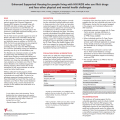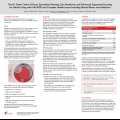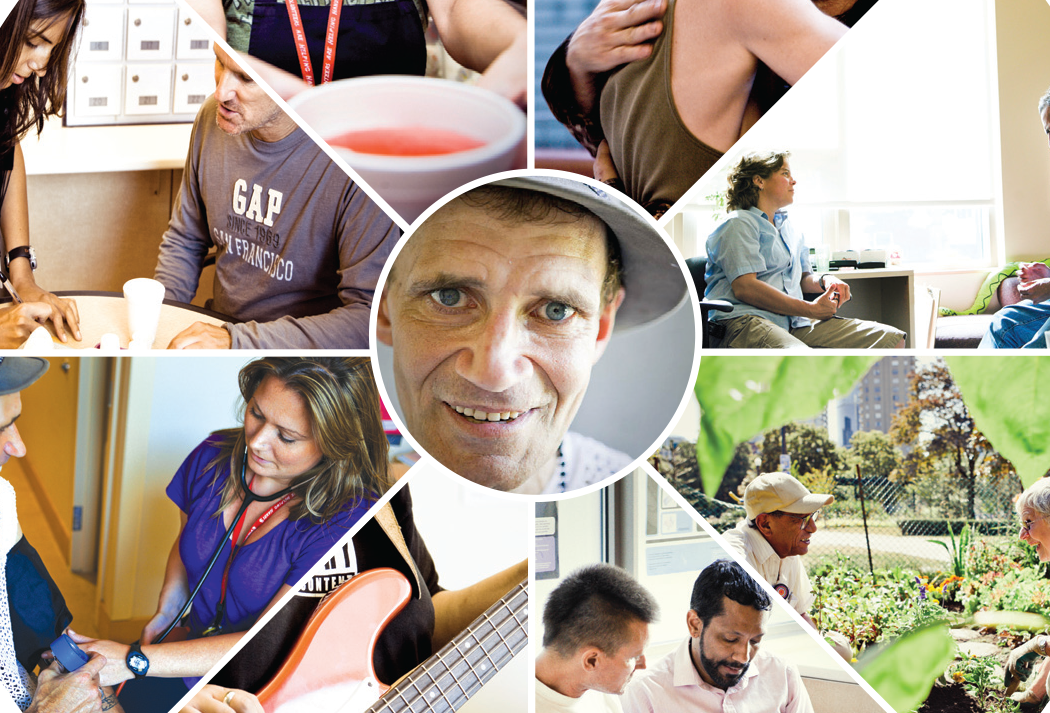What is the Program?

The Dr. Peter Centre, located in Vancouver, provides care and support to people living with HIV who are also coping with social disadvantages and concurrent health issues such as mental health conditions, addiction, hepatitis C, physical disabilities, homelessness and trauma. Through a range of services, the Dr. Peter Centre engages individuals in their healthcare with the goals of improved adherence to HIV treatment and improved overall health.
The Dr. Peter Centre operates three core programs:
- The Day Health Program is open seven days a week and provides nursing support, counselling and nutrient-dense meals as well as art, music and recreation therapies.
- The 24-hour Specialized Nursing Care Residence is a licensed long-term care facility that offers services from short-term stabilization to palliative care for people living with HIV who have multiple complex health disorders and social disadvantages.
- The Enhanced Supportive Housing Program consists of individual furnished suites in close proximity to the Dr. Peter Centre and offers eligible residents of the 24-hour Specialized Nursing Care Residence a long-term place to live independently with a series of programmatic supports.
This case study will explore the Dr. Peter Centre’s three programs through the services offered to the residents of the Enhanced Supportive Housing Program.
Why Was the Program Developed?
Vancouver’s Dr. Peter Jepson-Young, known simply as Dr. Peter on CBC Television, was a young gay physician living with AIDS. From 1990 to 1992, he shared his story of living with and dying of AIDS in his weekly Dr. Peter Diaries on CBC. Two weeks before he died, he established the Dr. Peter AIDS Foundation with a mission to provide comfort care for people living with HIV/AIDS.
In 1997, the Dr. Peter AIDS Foundation opened the Dr. Peter Centre Day Health Program in an old wing of St. Paul’s Hospital and a year later added a 10-bed 24-hour licensed care residence. In 2003, the Dr. Peter Centre moved to its permanent home near St. Paul’s Hospital and increased both its residential care and Day Health Program capacity by more than 100%.
The Enhanced Supportive Housing Program was conceptualized as a way for the Dr. Peter Centre to improve the flow of clients from St. Paul’s Hospital to the 24-hour Specialized Nursing Care Residence. Before the creation of the Enhanced Supportive Housing Program, residents in the 24-hour Specialized Nursing Care Residence often remained there after their health had stabilized and they no longer required the specialized nursing care of the Residence’s staff. However, they did still need other types of intensive support and remained in the Residence because there was no other appropriate housing option for them. This meant that new patients referred to the 24-hour Specialized Nursing Care Residence from St. Paul’s Hospital could not be admitted because the Residence was at capacity.
The Enhanced Supportive Housing Program serves 24-hour Specialized Nursing Care Residence clients who are ready to transition out of the Residence into more independent living. Participants in the Enhanced Supportive Housing Program are supported by both the Day Health Program and the Residence.
How Does the Program Work?
The Enhanced Supportive Housing Program (ESH) offers individual furnished suites near Dr. Peter Centre’s campus of care to people who are ready to transition out of the 24-hour Nursing Care Residence but continue to need intensive support. Currently, the Dr. Peter Centre leases eight suites and rents them to ESH clients in partnership with local housing societies.
The relationship between the Dr. Peter Centre and the ESH clients is outlined in a written agreement. Although clients live independently, they must adhere to specific criteria as outlined in the agreement, including active engagement in their care, ongoing communication with nurses, care aides and the case manager, and attendance at the Day Health Program.
ESH program services
All supports are based on the individual care plans that the case manager develops in collaboration with the ESH client. The care aide takes this plan and works with the client to achieve specific goals that include working toward developing daily living skills. Care is augmented by housekeeping staff who help residents keep their suites clean and safe.
Case manager
The case manager is the primary point of contact for ESH residents and manages the ESH residents’ support team. Before a client enters ESH, the case manager goes over their agreement: the client must agree to remain engaged in their care and to have a relationship with the case manager and must give Dr. Peter Centre staff, including the case manager, the care aide and housekeeping, permission to access their suite.
The case manager also works with ESH residents to identify their personal goals. Typically, this process promotes effective transition to the ESH program. The personal goals help keep ESH clients engaged in their care. The case manager meets at least weekly with the client to check in about any issues with the apartment, with their care or with their engagement in community, family and social activities and to check in about goals. This weekly meeting is a chance for the case manager to counsel clients, facilitate referrals and offer encouragement.
Part of the case manager’s role is to ensure that all of the providers and programs an ESH client uses, including the Day Health Program and external healthcare providers, are coordinating their services for the client. The case manager checks with staff involved with the ESH client’s care to see if they are accessing services, attending their appointments or changing their routine or behaviour. When routine changes are noticed that may indicate that the client is experiencing challenges or when specific problems arise, the case manager works with the client and their other providers to find potential solutions.
Care aide
A care aide provides day-to-day support for ESH residents with the activities of daily living. The care aide helps residents find a routine that works for them and helps them develop life skills. This may mean accompanying residents to appointments, helping them budget for the month, helping them with their shopping or helping them organize their suite.
The care aide works with the case manager and the resident to ensure that clients are working toward the goals they set for themselves. Often care aides are the first service providers who notice a change in a resident’s routine that may be a concern. They are able to share these observations with the case manager so that they can work with the client to resolve any issues that may have arisen.
Day Health Program
The foundation of the Day Health Program is that it is a safe environment in which participants can pursue their interests and goals. Program goals are improved adherence to HIV treatment and improved overall health.
As part of their involvement with the Enhanced Supportive Housing Program, ESH clients attend the Day Health Program. The Day Health Program is open daily from 9 a.m. to 3 p.m. It provides support for people living with HIV who have complex care needs. The Day Health Program is open to all ESH residents but also provides support to more than 350 other participants who have been referred to the program and have gone through an intake evaluation.
The Day Health Program, which is funded by Vancouver Coastal Health and donor revenue, is staffed by a complement of nurses and a nurse practitioner who provide medication management. Medication management is tailored to each participant’s needs to ensure optimal adherence. This ranges greatly from administration to safe storage of medications. Nurses may dispense all or some of a participant’s medications, including their HIV medication, hepatitis C treatment, methadone management or psychiatric medications.
Nurses also provide supervised injection services and participants have access to harm reduction materials, which they can take with them or use onsite. The nursing team supervises injections in the safe injection room and can also facilitate referrals to drug treatment should a participant want to reduce their substance use or stop using altogether.
Although Dr. Peter Centre nurses provide basic primary care, Day Health Program participants, including ESH residents have primary care providers in the community. When necessary, the nurse practitioner can work with clients to improve their engagement and communication with their primary care provider so that clients feel more comfortable seeking healthcare outside the Day Health Program.
The Day Health Program provides a range of services to participants including access to nutrient-dense meals, showers and laundry. Recreational, art and music therapists organize activities and engage clients in their healthcare.
24-hour Specialized Nursing Care Residence
The 24-hour Specialized Nursing Care Residence is the second vital resource in Dr. Peter Centre’s campus of care for ESH clients. Currently, all ESH residents are former clients of the Residence, which means that they had a relationship with the staff and were comfortable in the environment before entering the ESH program.
The Residence, funded by Vancouver Coastal Health and donor revenue, is a licensed long-term care facility for people living with HIV. Admission is given to people living with HIV who require 24-hour nursing care that cannot be provided in their home or in the community. Typically, when residents enter the program they are experiencing significant symptoms as a result of HIV and/or other illnesses such as hepatitis C. They may also have a history of poor adherence to their medications, have active symptoms of mental illness and poor adherence to therapy, have a history of active substance use and/or have a history of homelessness or unstable housing. The needs of the Residence clients range from short-term stabilization to end-of-life care.
ESH clients are encouraged to be independent but can seek health and support services from the Residence when the Day Health Program is closed.
Required Resources
- One case manager. Provides ongoing support to clients with complex health and psychosocial needs. Acts as the primary point of contact for residents. Acts as the point of contact for other service providers engaged in resident care.
- One care aide. Supports clients to achieve their goals by helping them with activities of daily living and building their capacity for self-management.
- Housekeeping. Supports clients in keeping a safe and clean environment.
- Strong housing partners to provide housing units.
- Strong linkages to comprehensive day programs and evening and overnight service providers.
Challenges
- Balancing self-management with support. ESH residents are able to live independently although they may continue to experience challenges as a result of HIV and co-morbidities. Dr. Peter Centre’s case manager must respect and foster this independence as they balance the requirement that residents have an ongoing, engaged relationship with ESH staff.
- Maintaining communication among healthcare providers. Dr. Peter Centre’s clients live with HIV as well as other complex physical and mental health challenges, including active substance use. Successfully coordinating care can be a challenge, when multiple providers with different perspectives may be involved. Clear, effective communication between these providers can be difficult but must be managed to keep the client at the centre of care.
- Addressing the impact of such intensive care and support on staff. Dr. Peter Centre provides intensive care and support to clients who live with HIV, mental and physical health challenges, trauma and active substance use. Working with this clientele can lead to strain on staff. In November 2014, to help staff remain resilient, Dr. Peter Centre enhanced its employee assistance program to provide ready access to individual and group counselling, debrief sessions and workshops to improve staff capacity to remain effective in their work.
Evaluation
 The ESH program encourages clients to have active and continued engagement with their healthcare team. Since 2011, 11 people have been a part of the ESH program and as of February 2016 there are eight people living in ESH units.
The ESH program encourages clients to have active and continued engagement with their healthcare team. Since 2011, 11 people have been a part of the ESH program and as of February 2016 there are eight people living in ESH units.
 The program successfully supports these clients to sustain a suppressed viral load (less than 200 copies/mL) and to engage in care. The eight clients participating in the ESH program as of June 2015 are living with multiple conditions that require complex care and support. They all are living with mental health conditions and experiencing cognitive impairment that challenges their ability to make decisions about everyday life. In addition to HIV and mental health issues, they all have chronic obstructive pulmonary disorder, which compromises their ability to breathe, and half of them are living with hepatitis C.
The program successfully supports these clients to sustain a suppressed viral load (less than 200 copies/mL) and to engage in care. The eight clients participating in the ESH program as of June 2015 are living with multiple conditions that require complex care and support. They all are living with mental health conditions and experiencing cognitive impairment that challenges their ability to make decisions about everyday life. In addition to HIV and mental health issues, they all have chronic obstructive pulmonary disorder, which compromises their ability to breathe, and half of them are living with hepatitis C.
For more information on Dr. Peter Centre’s successes, please see the Program materials sections of this case study.
Lessons Learned
Dr. Peter Centre has learned a number of lessons as a result of its long history of service provision:
- Provide multidisciplinary care. Dr. Peter Centre’s programs are multidisciplinary. They include health and social support, harm reduction and supervised injection services, as well as arts and music programs, which has created a holistic therapeutic environment for Dr. Peter Centre clients.
- Tailor care plans to the individual. Each Dr. Peter Centre client is different, and although the goals are the same—improved overall health and management of HIV—treatment plans need to be individualized based on the client’s needs so that they are respected through and engaged in the process.
- Have a robust model of care. Dr. Peter’s vision for the Dr. Peter Centre resulted in a model of care whose core concepts are followed by all staff. This foundation guides Dr. Peter Centre’s service delivery and program development.
- Engage in knowledge translation and exchange. Dr. Peter Centre actively shares its successes with other organizations working with people living with HIV. This knowledge exchange contributes to more effective programs and services in Vancouver and across Canada.
Program Materials
- Enhanced Supported Housing for People Living with HIV AIDS who Use Illicit Drugs
- The Dr. Peter Centre 24-Hour Specialized Nursing Care Residence and Enhanced Supported Housing
- The Dr. Peter Centre Enhanced Supported Housing Model PPT
- Dr. Peter Centre's Model of Care
- Engagement in Care at the Dr. Peter Centre
- Finding a way - Addressing intangible barriers that create treatment and care inequities
- Impact of supervised consumption services on access to and engagement with care
- Integrating full harm reduction strategies including supervised injection services
- Meeting needs of PLHIV with complex health issues
- The impact of an HIVAIDS adult integrated health program on leaving hospital against medical advice
Other Useful Materials
Information found on the CATIE website
Contact Information
Patrick McDougall, knowledge translation and evaluation coordinator
Dr. Peter Centre
pmcdougall@drpeter.org
604-331-5081

